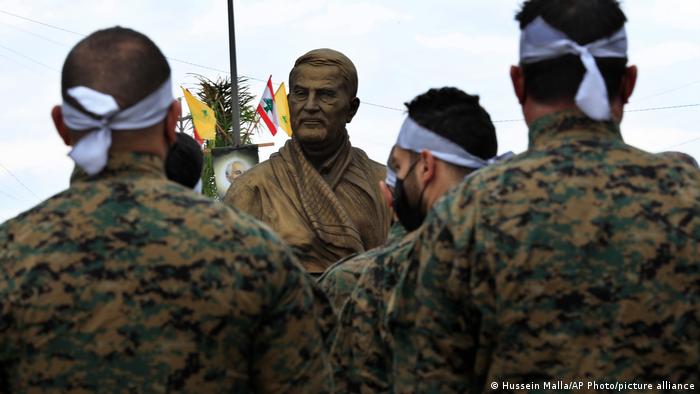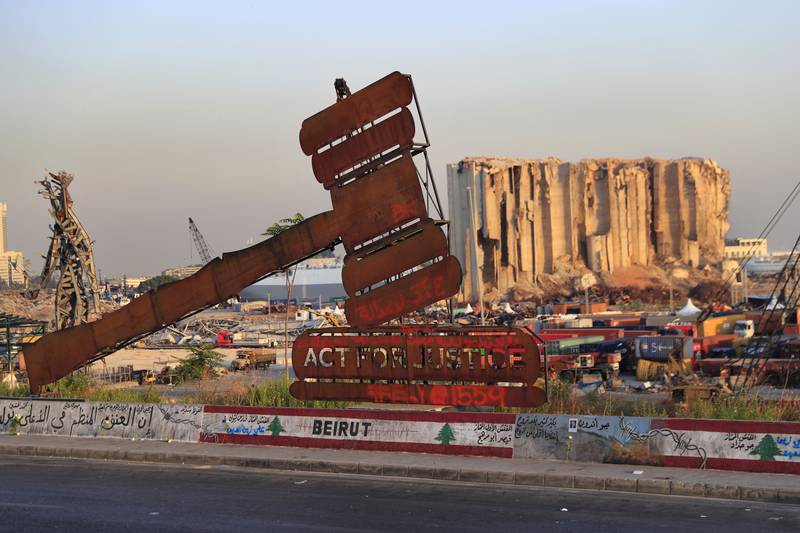by un.org — The following Security Council press statement was issued today by Council President Ronaldo Costa Filho (Brazil): The members of …

By Barak Ravid -- axios.com -- The Biden administration pressed the Lebanese government to criticize Hezbollah’s attempt to send drones to an Israeli natural gas rig in the Mediterranean and to commit to resolving the maritime border dispute with Israel only through negotiations, sources briefed on the issue told Axios. Why it matters: The U.S. is concerned Hezbollah's actions will sabotage its efforts to broker a deal between Israel and Lebanon on the maritime border by September. Lebanon and Israel each claim a potentially gas-rich, 330-square-mile area off their borders in the Mediterranean Sea. Driving the news: The Israeli military on Saturday shot down three Hezbollah drones headed toward the Karish gas rig. Hezbollah said it launched the unarmed drones on a reconnaissance mission meant to send a “message” to Israel.
Behind the scenes: U.S. energy envoy Amos Hochstein and U.S. ambassador to Lebanon Dorothy Shea spoke to senior political and military leaders in Lebanon over the weekend. They raised concerns about the drones incident and asked the Lebanese government to publicly speak against it, sources briefed on the issue said. According to the sources, Hochstein told several senior Lebanese officials that progress in the maritime border dispute with Israel will be achieved only through negotiations and not through provocations by Hezbollah. What they're saying: After the U.S. pressure, caretaker Prime Minister Najib Mikati and Foreign Minister Abdallah Bou Habib on Monday issued a statement committing to the U.S.-led negotiations and criticizing Hezbollah without directly mentioning it by name. "Any act that falls outside the framework of the state's responsibility and the diplomatic track within which negotiations are taking place, is unacceptable and exposes [Lebanon] to unnecessary risks," Bou Habib and Mikati said.

سجعان قزي
@AzziSejean
لا شكَّ أنَّ لدى المعنيّين النيّةَ الصادِقةَ لعدمِ تأليفِ حكومةٍ جديدة، ولا يَتورَّعون عن إعلانِها كلّما سَنحَت لهم المنابِر والحناجر. يَتوزَّعون، مع القوى السياسيّة، صلاحيّاتِ تعطيلِ المؤسّساتِ الدستوريّةِ كأنَّ التعطيلَ أصبح حالةً ميثاقيّة. كان المسُّ بمؤسّسةٍ دستوريّةٍ جريمةً لا تُغتَفر فصارت، في السنواتِ الأخيرة، وِجهةَ نَظر. كانوا يُقْدِمون عليها بخفَرٍ فصاروا يُجاهرون بها بوقاحة. كانوا يَجهَدُون لتأليفِ حكومةٍ جديدةٍ، فصاروا يَلتمِسون اجتهاداتٍ دستوريّةً من كلِّ صَوبٍ لتعويمِ حكومةٍ مستقيلة. كانت المنافسةُ لإشغالِ مناصبِ هذه المؤسّساتِ، فأمْسَت لتفريغِ المؤسّساتِ بحدِّ ذاتِها. دولةٌ في طورِ الأُفول قبلَ الاتّفاقِ على بديل.
أصلًا الدولةُ الأصيلةُ، دولةُ لبنانَ الكبير، عَدّها البعضُ دولةً بديلة. كان لبنانيّون يَعتبرونها بديلًا عن جبلٍ أشمَّ ما زال يُراودُ عِزّتَهم، وآخَرون بديلًا عن وِحدةٍ عربيّةٍ أو إسلاميّةٍ حضاريّةٍ هامدةٍ في الوِجدانِ، ومع حزبِ الله أُضيفَ مفهومُ الدولةِ الرديفةِ لإيران الخُمينيّة. واللافتُ الـمُحزِنُ أنَّ لبنانَ ما شارفَ في تاريخِه الحديثِ على السقوطِ الكيانيِّ أكثرَ ممّا حينِ تَـمَّ الاعترافُ به "وطنًا نهائيًا". في ظنّي، سببُ هذه الظاهرةِ الغريبةِ هو أنَّ الاعترافَ بنهائيّةِ لبنان تَرافقَ مع تغييرِ هُويّتِه، والخروجِ عن الحِياد، وتقويضِ انتظامِ مؤسّساتِه الدستوريّة، والانتقالِ مباشرةً من عدمِ الولاءِ للبنان إلى الرغبةِ في امتلاكِه من دونِ المرورِ بالولاءِ الحقيقيِّ والصادقِ والصافي. من يومِها صار التعيينُ قاعدةَ الديمقراطيّةِ اللبنانيّةِ والانتخابُ استثناءَها، وأصبَحت المؤسّساتُ الدستوريّةُ نوعًا من الكماليّاتِ أو الـمُتمِّمات.

by Nada Homsi | Jamie Prentis -- thenationalnews.com -- Dozens of protesters angered by the rapid deterioration of living standards in Lebanon marched through the capital Beirut on Tuesday evening and attempted to break into the headquarters of MTC Touch, one of the two state-contracted telecoms companies. The demonstrations, in which a handful of protesters clashed with security forces, came days after a major jump in the cost of phone and internet services — the latest price rise in a country suffering from inflation of more than 200 per cent. To attend the protest, demonstrators Bassil Hatoum, Maan Moghrabi and Yaman Moghrabi had to split the petrol bill on their way from Kfar Silwan, a village more than an hour away from Beirut. Anger in Lebanon as struggling telecoms sector increases rates “We can't afford to get here without splitting it. And that’s just us,” said Mr Hatoum, a 27-year-old music manager. “Imagine all the people who can’t afford to come to these protests because they can’t afford the petrol to get here.”
Lebanon’s economic collapse, which began in 2019, has caused about 80 per cent of Lebanon’s population to slip below the poverty line. Dire shortages of basic goods and services have plagued the state in the years since. State electricity is nearly nonexistent, so the majority of Lebanon’s population relies on expensive private generator subscriptions for backup electricity. These are powered by diesel, itself often a scarce commodity in the troubled nation. Water, bread, fuel and medicine are also often in short supply and the local currency has plunged in value by more than 90 per cent. “They’ve brought us to below poverty and somehow they’re still in power,” Mr Hatoum said, referring to Lebanon’s political elite, many of whom transition from their roles as warlords during the country's civil war — which ended 30 years ago — to national leaders. Mr Hatoum described them as “mafia leaders”. “They’re experts at staying in power through clientelism,” 32-year-old Mr Moghrabi, another of the protesters, added. “No one is comfortable, except for those with money or people who benefit directly from having the political class in power.”
Khazen History


Historical Feature:
Churches and Monasteries of the Khazen family

St. Anthony of Padua Church in Ballouneh
Mar Abda Church in Bakaatit Kanaan
Saint Michael Church in Bkaatouta
Saint Therese Church in Qolayaat
Saint Simeon Stylites (مار سمعان العامودي) Church In Ajaltoun
Virgin Mary Church (سيدة المعونات) in Sheilé
Assumption of Mary Church in Ballouneh
1 - The sword of the Maronite Prince
2 - LES KHAZEN CONSULS DE FRANCE
3 - LES MARONITES & LES KHAZEN
4 - LES MAAN & LES KHAZEN
5 - ORIGINE DE LA FAMILLE
Population Movements to Keserwan - The Khazens and The Maans
ما جاء عن الثورة في المقاطعة الكسروانية
ثورة أهالي كسروان على المشايخ الخوازنة وأسبابها
Origins of the "Prince of Maronite" Title
Growing diversity: the Khazin sheiks and the clergy in the first decades of the 18th century
Historical Members:
Barbar Beik El Khazen [English]
Patriach Toubia Kaiss El Khazen(Biography & Life Part1 Part2) (Arabic)
Patriach Youssef Dargham El Khazen (Cont'd)
Cheikh Bishara Jafal El Khazen
Patriarch Youssef Raji El Khazen
The Martyrs Cheikh Philippe & Cheikh Farid El Khazen
Cheikh Nawfal El Khazen (Consul De France)
Cheikh Hossun El Khazen (Consul De France)
Cheikh Abou-Nawfal El Khazen (Consul De France)
Cheikh Francis Abee Nader & his son Yousef
Cheikh Abou-Kanso El Khazen (Consul De France)
Cheikh Abou Nader El Khazen
Cheikh Chafic El Khazen
Cheikh Keserwan El Khazen
Cheikh Serhal El Khazen [English]
Cheikh Rafiq El Khazen [English]
Cheikh Hanna El Khazen
Cheikha Arzi El Khazen
Marie El Khazen